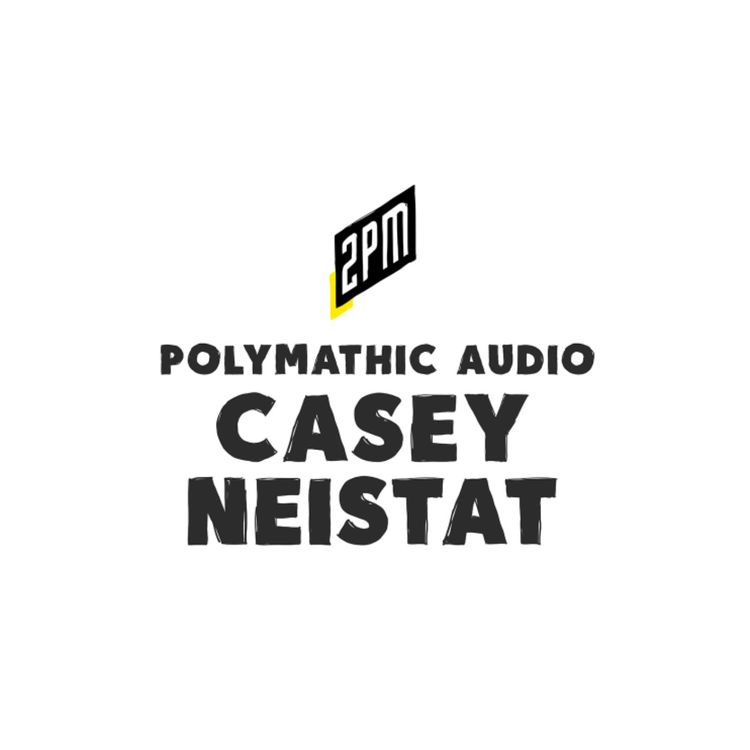Share

Polymathic Audio by 2PM Inc.
Ep. 017: Casey Neistat
Casey Neistat is one of the true pioneers of the creator economy. But perhaps unlike some of today's stars, Casey used YouTube not to seek out fun and fame but as a vehicle for monetizing individual creativity, long before that was an industry itself. No conversation with Casey bypasses his experiences as one of the most prolific YouTube creators of all time; this one focuses on how he's diversified since his rise on the platform. He discusses tenacity and how nuanced a role it plays in balancing aspiration and success for creators. Casey goes on to explain how his personality and ambitions drove his nonstop creative streak, one that included 700 straight days of video blogging. This short conversation spans his success with YouTube to founding (and selling) a software company and to his present-day role as a growing investor with time for fatherhood and hobbies. The conversation concludes with a discussion around the future of decentralized finance, the catalysts for Casey’s personal passion surrounding the matter, and the implications of solutions on both domestic and global investing and transactions alike.
More episodes
View all episodes

6. Ep. 016: Alexis Gay
45:21||Season 2, Ep. 6This conversation between Alexis Gay and myself was actually our second; it was equally fascinating. Gay and I talked everything but business just a few weeks back on her new creation: Non-Technical Podcast. The subject matter was slightly different for this one. The passion and creator economies are here and they’re scaling fast. A key player in this trajectory is Patreon, where our guest worked as a director of creator partnerships and business operations. The conversation moves to the dynamics of companies the likes of Patreon, Substack, Memberful, and their role in the growth and autonomy of the multi-SKU creator. She is one of the first to pursue the uncharted waters of building a comedic portfolio, during a pandemic, in a largely still-unrefined creative landscape.
5. Ep. 015: Kyle Alex Brett
54:23||Season 2, Ep. 5A graduate of Howard Law School, Kyle Alex Brett now serves as counsel to Netflix after a few unfulfilling stops with various corporate and entertainment law groups. The film analyst and lawyer now works on the independent films side: which constitutes films that fall under a $40 million production budget. This conversation covers the daily responsibilities of an operator who moonlights as a creator within the machine of a streaming economy giant. We took a deep-dive into the new Netflix film Ma Rainey’s Black Bottom, and the strength of a Netflix corporate culture that prioritizes talent and people (See the recent decision regarding Chappelle Show).Brett also shares personal and abstract philosophy that influences his effective, consistent, and infectious presence on Twitter. Kyle’s voice and actions are rooted in the principle of prolific creation: repetition that outlasts the noise. Of course, the conversation ultimately converges on the future of the film industry and the rise and inevitability of streaming as the primary method of box office growth.
4. Ep. 014: Rafat Ali
43:15||Season 2, Ep. 4Of my favorite episodes are ones where I am the student and my guest is the teacher. This is one of them. Rafat Ali is the CEO and Founder of Skift, a B2B media company and travel intelligence startup. Founded just eight years ago, Ali and the Skift team have raised just $3 million and they now employ 66 at Skift. Ali’s expressed goal is to become the Bloomberg of travel intelligence.Joining us from Morocco, this episode is full of actionable insights. We discuss Substack, building independent media brands, and a conversation about Amazon and air travel that combined our two worlds of niche study: travel and eCommerce.Skift is the B2B equivalent of the B2C media brands like Barstool, Hodinkee, and Goop that receive a lot of credit for their innovate revenue and community practices. It’s about time that the average consumer sees the travel intelligence company for what it is – a generational media brand in the works. This 43 minutes is a masterclass in the “zero to one” of building a media brand.
3. Ep. 013: Joe Pompliano
35:55||Season 2, Ep. 3Joe Pompliano’s slice of passion economy sits at the crossroads of sports and business – an area once served by ESPN’s Darren Rovell. The younger Pompliano brother (yes, we have featured his older brother Anthony) has taken up the mantle. In just six months, he’s built a Twitter following from 0 to 80,000 followers and a newsletter that is now cited by mainstream media. Yes, the former banker writes Huddle Up, a daily newsletter that provides consistent commentary on the business of sports. This episode discusses the business of consistency, how his career in finance prepared him for the rigors of media, building a Substack community, and the future of his business. And who he’d sell to, if they asked.
2. Ep. 012: Grace Garcia Clarke
47:21||Season 2, Ep. 2Grace Clarke is an enigma. She's someone who should be known for the depth and power of her ideas but - at least thus far - she chooses to fly under the radar. I often tell people that she’s one of the smartest people that I know – even if she doesn’t agree with me. Our first introduction was in the Lean Luxe slack room in December 2019 where she and I wrestled on the merits of the Peloton advertisement that set the internet ablaze. I was sure that we’d never recover from that argument. Fortunately, I was very wrong.She’s a former operative at Derris PR where she built the profitable content practice from the ground up. Not only did she thrive on the agency side, she was formerly a marketer at Madewell and a journalist – first in print and then on the digital side for Conde Nast. Her experience is broad. In practice – she is the essence of the study of linear commerce. This is why many in the digital spaces are beginning to view her as a go-to thinker. And I am convinced that one day soon, she will become one of the preeminent consulting partners for progressive Fortune 500 companies on best practices in new media and digital commerce.Hailing from the Midwest but a city girl at heart, I am proud to call her a friend and a colleague. And you will be, as well. Get to know Grace.
1. Ep. 011: Everette Taylor
46:47||Season 2, Ep. 1Everette Taylor is the Chief Marketing Officer of Artsy, an online platform for “discovering, buying and selling fine art. Artsy’s search engine and database draw connections and map relationships among works of art.” But Everette is more than an executive or Twitter personality, he’s a walking testament of the strength of perseverance.After fighting homelessness, Taylor attended Virginia Tech. By the age of 19, he started his first company – one that would sell by 21. After dropping out, he would become the VP of marketing at Qualaroo (acquired: Xenon Venture). He’d go on to found MilliSense in 2014 and then become the CMO of Sticker Mule and a growth strategist for Microsoft. Taylor then led marketing for Skurt (acquired: Fair). And then in 2016, his newest venture PopSocial netted $2 million in year one, only to be wound down.He founded a company with actress and businesswoman Zoe Saldana and shortly after became the CMO of Artsy. He has been awarded Social Media Influencer of the year in 2016 by Black Enterprise and he was awarded Forbes 30 Under 30 in 2018.This is a truly fascinating conversation with the admitted “street entrepreneur” and college dropout turned go-to marketing executive. He proves that no path is a necessary path for a great destination. He’s certainly made it.
10. Ep. 010: Anthony Pompliano
56:45||Season 1, Ep. 10Anthony Pompliano joined the latest episode of Polymathic Audio. He shared thoughts on all-things media and commerce with an emphasis on the opportunity surrounding vertical integration. The conversation builds around the importance of customer acquisition on the journey of building brands, and the order of operations for those who are looking to leverage and maximize. From the perspective of both an investor and content creator, Anthony dives into the synergy between his creative and business processes.At the crossroads of media and commerce, Anthony proposes an alternative structuring of the agreement between Barstool Sports and Penn Gaming, the company that recently acquired them. Web and Anthony also discuss the educational system, higher education, the concept of credentialism, and what it all means in the present and future moments.This is a truly fascinating conversation.
9. Ep. 009: Sahil Lavingia
51:25||Season 1, Ep. 9Sahil Lavingia built Gumroad in a weekend. At 19, the eCommerce entrepreneur was on top of the world. Within a few months, he raised $1 million from a who's who of investors: Naval, Max Levchin, Accel, and First Round. Soon after, Lavingia raised capital from Kleiner Perkins Caufield & Byers. In total, he raised $8.1 million. In a now-famous essay on his journey from venture-backed founder to boot strapped entrepreneur, he shares a bit about his journey. There was a rise, the fall, and a continued return.The idea behind Gumroad was simple: Creators and others should be able to sell their products directly to their audiences with quick, simple links. No need for a storefront.I built Gumroad the weekend I thought up the idea, and launched it early Monday morning on Hacker News. The reaction exceeded my grandest aspirations. Over 52,000 people checked it out on the first day.Later that year, I left my job as the second employee at Pinterest — before I vested any of my stock — to turn Gumroad into what I thought would become my life’s work. [1]Lavingia languished in the spotlight until growth stalled.We grew the team. We stayed focused on our product. The monthly numbers started to climb. And then, at some point, they didn’t.Gumroad has become a stalwart in the creator economy because of Lavingia's next steps. From nearly shuttering to a profitable, lifestyle business: Gumroad has fueled millions in monthly commerce for content creators. It's spawned competition from platforms like Patreon, Memberful, and now Substack. But I wouldn't count the founder out. Lavingia is playing a long game, he's growing on cash flow, and he has a specific vision for the creative future. In fact, he's planning an active role in it.Known for his insightful tweets and quick wit, Lavingia is now raising a fund to continue acting on his intuitions. From funding underrepresented minorities to new proponents of internet-born creativity, the Creator Economy is just beginning. He's taken it upon himself to make it more accessible. For Sahil Lavingia and Gumroad, they're well positioned to profit from it.